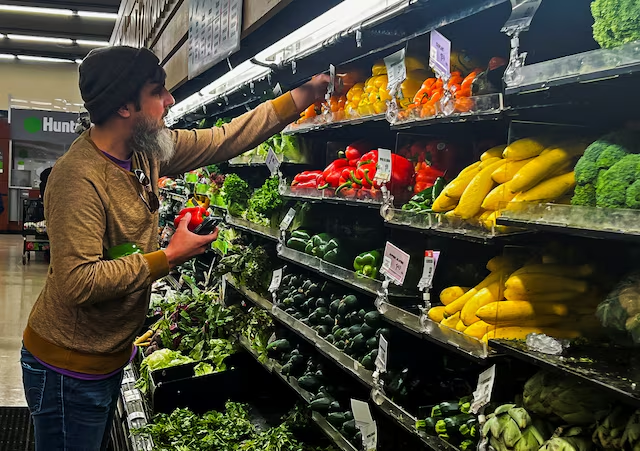Breaking News


Fast, Reliable, and Uncensored News Coverage


U.S. consumers already struggling with rising beef and egg prices could see even higher costs for meat, vegetables, and fruit if President Donald Trump tariffs on imports from Canada and Mexico, according to economists and food industry executives.
Consumers have faced persistent inflation since the COVID-19 pandemic and supported Trump partly due to dissatisfaction with rising prices. Trump promised to reduce costs for everyday Americans.
The White House confirmed on Friday that the new Donald Trump Tariffs on Canada and Mexico will take effect on February 1, declining a Reuters report that suggested they would be delayed until March 1.
Tariff-related price hikes would further strain consumers’ budgets as beef prices are near record highs, and egg costs have poured following bird flu, which wiped out millions of egg-laying hens. Additionally, bird flu in dairy cows has reduced milk production in top-producer California.
Shortly after taking office last week, Donald Trump Tariffs set a February 1 deadline for imposing 25% tariffs on imports from Mexico and Canada unless the countries take action to stop unlawful immigration and the deadly opioid fentanyl from entering the U.S. He also announced plans to impose a 10% tariff on Chinese goods due to the country’s involvement in the fentanyl trade.
Any increase in expenses due to the donald Trump Tariffs effectively acts as a ‘food tax’ on consumers for imported products and is not a worthwhile solution,” said David Cutler, spokesman for the National Grocers Association.
Tariffs are paid by importers, not exporters, who either pass the costs on to consumers or absorb the losses through reduced profits.
The Trump administration maintains that its planned tariffs will not lead to higher prices in the U.S. Vice President JD Vance stated on Sunday that consumer prices will eventually decrease, though it may not happen right away.
In 2023, the United States imported $195.9 billion worth of agricultural goods from global suppliers, according to U.S. Department of Agriculture and U.S. Customs data. Of that, nearly $86 billion came from Mexico and Canada, the top two suppliers, accounting for 44% of the total.
We import most of our fresh fruit and vegetables from Mexico and Canada, so you will see inflation on those products,” said Rob Fox, an economist and director of CoBank’s Knowledge Exchange
“These are products that are not easily replaced,” he said. “I can’t go out and plant tomatoes in Illinois in January and expect to replace them.”
According to the USDA, about two-thirds of U.S. vegetable imports and half of its fruit and nut imports come from Mexico. This includes nearly 90% of its avocados, 35% of its orange juice, and 20% of its strawberries.
Avocados from Mexico, the marketing arm of Mexico’s avocado industry, was shipping 52 to 53 million pounds of avocados to the U.S. each week in December, according to CEO Alvaro Luque. He added that this number rises to over 70 million pounds ahead of the U.S. Super Bowl on February 9, underscoring America’s strong demand.
David Ortega, an economist at Michigan State University, stated that the simple threat of tariffs can be inflationary.
“Food companies are scrambling to come up with possibility plans for where they might source these products if the tariffs are implemented, and that adds cost to their operations,” he said.
The U.S. typically imports over 1 million cattle from Mexico annually, but shipments have been blocked since late November due to a pest discovery in Mexico. Canadian cattle are also imported into the U.S. for fattening and slaughter. Analysts warn that tariffs or trade disruptions could impact a wide range of beef products, from ground beef to steaks.
Uncertainty surrounding tariffs has led U.S. meat buyers to secure domestic or imported supplies before February 1, according to Bob Chudy, a consultant for beef importers. “If it goes through as threatened, it will push U.S. beef prices up significantly,” he said.
U.S. retail prices for ground beef hit a record $5.67 per pound in September and were slightly lower last month, according to the Bureau of Labor Statistics. Prices have risen 42% over the past four years.
Despite record prices, U.S. beef demand reached a 38-year high in 2024, said Lance Zimmerman, senior animal protein analyst for RaboResearch Food & Agribusiness. Increased imports and heavier cattle weights have helped offset smaller domestic herds, which have been impacted by drought conditions. U.S. cattle inventories have fallen to their lowest levels in decades, with it taking about two years to raise a cow for slaughter.
Beef prices are high right now, and trade disruptions can introduce some chaos into the markets,” Zimmerman added.
MarslinkNews Read more

ShareMLN: 05/02/2026 New York City Mayor Zohran Mamdani endorsed Gov. Kathy Hochul’s reelection bid, giving the Democratic governor a notable boost with progressive voters as she faces a primary challenge and a competitive general election later this year In an op-ed published in The Nation, Mamdani said the Democratic Party works best when it channels

ShareMLN: 05/02/2026 Calls to poison control centers linked to overdoses of popular weight-loss medications are rising as use of GLP-1 drugs continues to expand, with some cases involving children who accidentally ingest or inject the drugs. GLP-1 medications such as Ozempic and Zepbound are designed to be injected, often on a weekly schedule, meaning the

ShareMLN: 05/02/2026 Nigeria’s first lady Oluremi Tinubu said international concern over the persecution of Christians in Nigeria is often driven by propaganda, but described President Donald Trump’s focus on protecting Christians as a divine intervention that has opened space to deepen ties with the United States and confront insecurity and terrorism. Speaking in Washington while